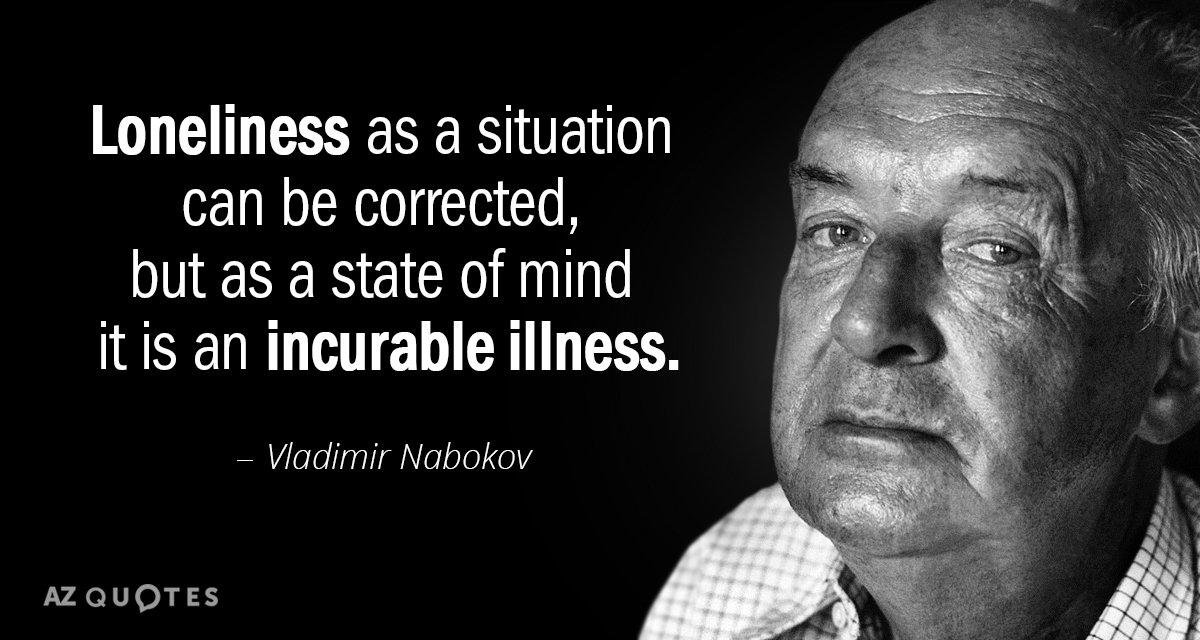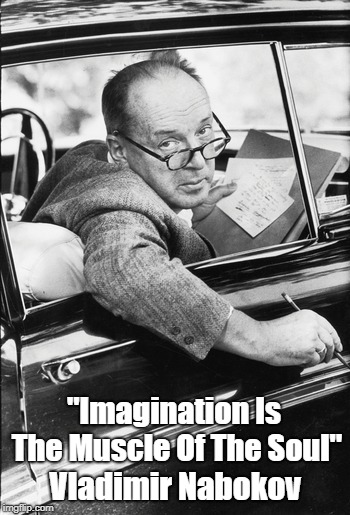
Against Common Sense: Vladimir Nabokov On The Wellspring Of Wonder & Why Belief In Goodness Is A Moral Obligation
Maria Popova, Brain Pickings
Maria Popova, Brain Pickings
“Once we leave those domains of human experience, there’s no reason to expect the laws of nature to continue to obey our expectations, since our expectations are dependent on a limited set of experiences,” Carl Sagan observed in considering how common sense blinds us to the reality of the universe. Perhaps worse yet — worse than the wrong beliefs we held for millennia about our planet’s shape, motion, and position in the cosmos, just because it feels flat and steady beneath our feet and is the center of everything we know — common sense often blinds us to the reality of our own interior world. It impoverishes our experience of the uncommonest, most delicate, most beautiful aspects of being and leads us, as I wrote in the prelude to Figuring, to mistake our labels and models of things for the things themselves.
How to lift the blinders of common sense that unfit us for seeing wonder is what Vladimir Nabokov (April 22, 1899–July 2, 1977) explores with uncommon wisdom, wit, and splendor of sentiment in a lecture he delivered at Wellesley College in 1941, titled “The Art of Literature and Commonsense” and later included in the superb posthumous 1980 volume Lectures on Literature (public library).

Vladimir Nabokov
Nabokov writes:
In the fall of 1811 Noah Webster, working steadily through the C’s, defined commonsense as “good sound ordinary sense . . . free from emotional bias or intellectual subtlety… horse sense.” This is rather a flattering view of the creature, for the biography of commonsense makes nasty reading. Commonsense has trampled down many a gentle genius whose eyes had delighted in a too early moonbeam of some too early truth; commonsense has back-kicked dirt at the loveliest of queer paintings because a blue tree seemed madness to its well-meaning hoof; commonsense has prompted ugly but strong nations to crush their fair but frail neighbors the moment a gap in history offered a chance that it would have been ridiculous not to exploit. Commonsense is fundamentally immoral, for the natural morals of mankind are as irrational as the magic rites that they evolved since the immemorial dimness of time. Commonsense at its worst is sense made common, and so everything is comfortably cheapened by its touch. Commonsense is square whereas all the most essential visions and values of life are beautifully round, as round as the universe or the eyes of a child at its first circus show.

With an eye to the innumerable offenses against sanity and justice perpetrated by an unquestioning adherence to so-called common sense, Nabokov adds:
It is instructive to think that there is not a single person in this room, or for that matter in any room in the world, who, at some nicely chosen point in historical space-time would not be put to death there and then, here and now, by a commonsensical majority in righteous rage. The color of one’s creed, neckties, eyes, thoughts, manners, speech, is sure to meet somewhere in time or space with a fatal objection from a mob that hates that particular tone. And the more brilliant, the more unusual the man, the nearer he is to the stake. Stranger always rhymes with danger. The meek prophet, the enchanter in his cave, the indignant artist, the nonconforming little schoolboy, all share in the same sacred danger. And this being so, let us bless them, let us bless the freak; for in the natural evolution of things, the ape would perhaps never have become man had not a freak appeared in the family. Anybody whose mind is proud enough not to breed true, secretly carries a bomb at the back of his brain; and so I suggest, just for the fun of the thing, taking that private bomb and carefully dropping it upon the model city of commonsense. In the brilliant light of the ensuing explosion many curious things will appear; our rarer senses will supplant for a brief spell the dominant vulgarian that squeezes Sinbad’s neck in the catch-as-catch-can match between the adopted self and the inner one. I am triumphantly mixing metaphors because that is exactly what they are intended for when they follow the course of their secret connections — which from a writer’s point of view is the first positive result of the defeat of commonsense.
But there is a second, deeper consequence of defeating common sense. A century after Walt Whitman extolled optimism as our mightiest resistance against the corruptions of society, Nabokov frames optimism not as a luxury of privilege but as an imperative of survival. He writes:
The second result is that the irrational belief in the goodness of man… becomes something much more than the wobbly basis of idealistic philosophies. It becomes a solid and iridescent truth. This means that goodness becomes a central and tangible part of one’s world, which world at first sight seems hard to identify with the modern one of newspaper editors and other bright pessimists, who will tell you that it is, mildly speaking, illogical to applaud the supremacy of good at a time when something called the police state, or communism, is trying to turn the globe into five million square miles of terror, stupidity, and barbed wire. And they may add that it is one thing to beam at one’s private universe in the snuggest nook of an unshelled and well-fed country and quite another to try and keep sane among crashing buildings in the roaring and whining night. But within the emphatically and unshakably illogical world which I am advertising as a home for the spirit, war gods are unreal not because they are conveniently remote in physical space from the reality of a reading lamp and the solidity of a fountain pen, but because I cannot imagine (and that is saying a good deal) such circumstances as might impinge upon the lovely and lovable world which quietly persists, whereas I can very well imagine that my fellow dreamers, thousands of whom roam the earth, keep to these same irrational and divine standards during the darkest and most dazzling hours of physical danger, pain, dust, death.

Vladimir Nabokov as a child (Nabokov Museum)
Nabokov locates the antipode of common sense in “the supremacy of the detail over the general, of the part that is more alive than the whole, of the little thing which a man observes and greets with a friendly nod of the spirit while the crowd around him is being driven by some common impulse to some common goal.” Speaking at the peak of WWII, as John Steinbeck is writing on the other side of the continent that “all the goodness and the heroisms will rise up again, then be cut down again and rise up,” Nabokov offers:
I take my hat off to the hero who dashes into a burning house and saves his neighbor’s child; but I shake his hand if he has risked squandering a precious five seconds to find and save, together with the child, its favorite toy. I remember a cartoon depicting a chimney sweep falling from the roof of a tall building and noticing on the way that a sign-board had one word spelled wrong, and wondering in his headlong flight why nobody had thought of correcting it. In a sense, we all are crashing to our death from the top story of our birth to the flat stones of the churchyard and wondering with an immortal Alice in Wonderland at the patterns of the passing wall. This capacity to wonder at trifles — no matter the imminent peril — these asides of the spirit, these footnotes in the volume of life are the highest forms of consciousness, and it is in this childishly speculative state of mind, so different from commonsense and its logic, that we know the world to be good.
In the remainder of this piece from his altogether magnificent Lectures on Literature, Nabokov goes on to explore how the rejection of common sense factors into the creative process and the two types of inspiration. For more of his abiding insight into art and life, see Nabokov on the three qualities of a great storyteller, what makes a good reader, and the six short stories everyone ought to read, then revisit his exquisite love letters to Véra.

No comments:
Post a Comment